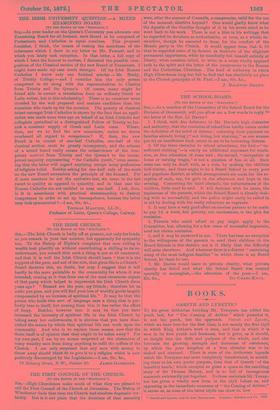THE FIRST COUNCIL OF THE CHURCH.
[To THE EDITOR OF THE "SPECTATOR.")
Sin,—High Churchmen make much of what they are pleased to call the Find Council of the Church at Jerusalem. The Bishop of Winchester finds that then the Church had absolute dogmatic cer- tainty. But is it not plain that the decisions of that assembly
were, after the manner of Councils, a compromise, valid for the use of the moment, abortive beyond? One would gladly know what the Apostle of the Gentiles thought of it in his secret mind as he went back to his work. There is not a hint in his writings- that he regarded its decisions as authoritative, or even, as a whole, in- structive, though he assented to them, for the comfort of the Mosaic party in the Church. It would appear from Gal. ii. 10 that he regarded some of its decrees as destitute of the slightest permanent importance, while he manifestly felt himself entirely at liberty, when occasion called, to write in a sense wholly opposed both to the spirit and the letter of the compromise to the Roman and the Corinthian Churches. The kind of authority in which High Churchmen long but fail to find rest has absolutely no place in the Church principles of St. Paul.—I am, Sir, &c.,
J. BALDWIN BROWN.


































 Previous page
Previous page